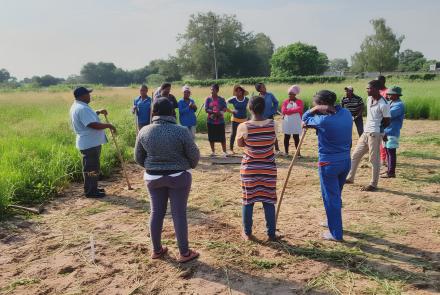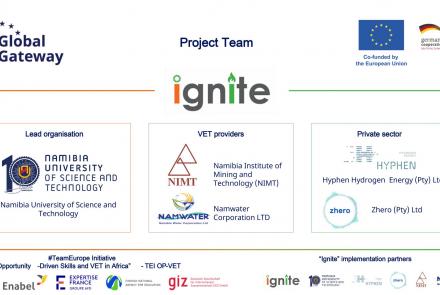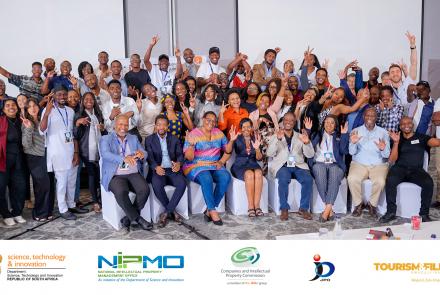NUST Celebrates Innovation at the 2024 Institutional Research Week
NUST concluded its 2024 Institutional Research Week (IRW) under the theme ‘Advancing Human-Centric Research, Innovation and Sustainability’. The event, which took place from 28 to 30 October at NUST’s lower campus, gathered researchers, industry leaders and policymakers committed to advancing research that prioritises societal impact, sustainability, and innovation.
The event provided a dynamic platform for knowledge-sharing, inviting participants from across faculties and disciplines to engage on their research endeavours and breakthroughs. With a mix of live presentations, interactive panels, and networking opportunities, IRW 2024 exemplified NUST’s commitment to establishing a research ecosystem that bridges theory and practice, ultimately driving meaningful impact within and beyond Namibia.
Setting the scene with highlights on quality and community-driven research
Acting Deputy Vice-Chancellor Dr Colin Stanley underscored NUST’s commitment to fostering a research culture that prioritises humanity and sustainable solutions during the opening session. “The work we do must contribute not only to the advancement of knowledge, but also to the development of resilient societies that can thrive in the face of contemporary global challenges,” he stated, highlighting research areas from health infrastructure to artificial intelligence technologies.
Similarly, Prof Anicia Peters, Chief Executive Officer of the National Commission on Research Science and Technology (NCRST), reinforced that impactful research should focus on quality over quantity. She advocated for transformative and community-engaged research, noting: “It is imperative to involve the community when addressing sustainable research matters.”
In the spirit of research internationalisation, NUST welcomed international experts, such as Prof Andreas Mogelmose from Aalborg University and Prof Suraj Kothari from Iowa State University, whose research underscores the practical application of artificial intelligence and aerospace engineering. Their contributions, along with insights from local leaders, cultivated a collaborative environment that highlighted the role of innovation in addressing complex issues, from enhancing national security to transforming education systems in the digital age.
Deep diving into cutting-edge initiatives
The week was filled with technical sessions, translated into a palatable range of topics - from cybersecurity in critical health infrastructure to smart agriculture and language preservation among Namibia’s indigenous youth - ensuring that the wider public can understand the impact. The presentations reflected NUST’s leadership in digital inclusion, exemplified by projects such as the ‘Extended Reality Escape Room’ and ‘Himbaverse’, which leverage immersive technologies to expand cultural and educational experiences.
“Research is the mechanism through which we respond to both present and future challenges, whether it is through investigating sustainable agricultural practices, advancing cybersecurity or developing predictive models for climate change,” was stressed by Dr Lisho Mundia, Deputy Executive Director of Research at the Ministry of Higher Education, Technology, and Innovation, who addressed the event. Sharing the passion of researchers, being an academic himself, he further focused on the necessity for research to drive policy, economic resilience, and social well-being.
Sessions throughout the week covered a spectrum of transformative research projects, such as sustainable agricultural models that address food security and innovative artificial intelligence solutions for predictive analytics in healthcare. By aligning research efforts with Namibia’s economic and environmental goals, NUST encourages practical applications that resonate with both immediate and long-term developmental needs, empowering researchers to create solutions with real-world benefits.
Recognising excellence in research: Inaugural professorial lectures and awards
A significant milestone of the week was the inaugural session for Professors Sulaiman Atiku and Uchendu Eugene Chigbu.
Prof Atiku is ranked among the top experts in his field, covering 12 to 15 of 17 Sustainable Development Goals (SDGs), which emphasises his commitment to integrating sustainable practices within human resource management. He specialises in strategic human resource management, focusing on human capital formation for Industry 5.0 and people management practices for sustainability. With over 16 years of experience in higher education across Nigeria, South Africa, Ghana, and Namibia, he has lectured on various aspects of human resources and organisational behaviour, equipping future leaders with the skills needed to navigate complex challenges in today’s workforce.
Prof Chigbu is renowned for leading a dynamic research group that exemplifies his passion for placing people at the centre of his work and harnessing the power of networks. He serves as an Associate Editor for Land Use Policy (Elsevier) and as Section Editor for Local Development and Society (Routledge). As a social geodesist, Prof Chigbu investigates critical societal challenges related to land administration and management, including land-use planning, land and natural resource tenure, land policy and governance, and urban transformation efforts. His research not only addresses these complex issues, but also emphasises collaborative approaches to enhance community well-being.
Both are distinguished in governance, management sciences, and land use, contributing to NUST’s growing influence in these fields. Their lectures set the stage for advancing human-centric approaches to governance and resource management.
Furthermore, the university hosted its prestigious 2024 Institutional Research of the Year Awards at the High-Tech Transfer Plaza Select (HTTPS) on 30 October. The event celebrated the achievements of researchers whose innovative and impactful work is shaping academic and societal advancement in Namibia and beyond.
The awards highlight NUST's commitment to nurture a vibrant research culture. By recognising excellence across various research stages - from emerging to established researchers - the awards underscore NUST’s dedication to supporting ground-breaking work that aligns with national and global development goals.
Following an overview of the awards by Dr Stanley, the evening continued with an insightful address from Prof Haileleul Zeleke Woldemariam, Best Institutional Senior Researcher of the Year 2023, who shared his journey. “The seed funds received, although small, went a long way - it supported 15 Master’s students’ research work – and, for me, the investment in young minds within the space of linguistics and languages was the best reward.”
This year, NUST recognised exemplary individuals across several categories:
- Emerging Researcher of the Year: Ms Jennilee Magdalena Kohima (Faculty of Engineering and the Built Environment)
- Developing Researcher of the Year: Dr Nikodemus Angula (Faculty of Commerce, Human Sciences, and Education)
- Established Researcher of the Year: Dr Oluibukun Gbenga Ajayi (Faculty of Engineering and the Built Environment)
Winners received research seed funds, personalised cost centre allocations, and individual tokens of appreciation as incentives to continue their impactful work.
NUST’s Institutional Research of the Year Awards serve as a vital platform for recognising research excellence, promoting collaborative efforts, and encouraging innovative thought. As Namibia prepares to tackle complex national challenges, NUST’s researchers stand at the forefront, contributing essential knowledge, technology advancements, and policy insights that pave the way for a brighter future.
Commitment to a sustainable and inclusive future
As NUST continues to support advancements in technology and research, it remains committed to fostering innovation that places people and the planet first, ensuring that Namibians benefit from the scientific progress and technological developments of tomorrow.
The IRW highlighted NUST’s strategic goal of making research accessible and inclusive, with a vision to develop a research community that values diversity of thought, interdisciplinary collaboration, and global partnerships. Moving forward, NUST aims to nurture a generation of researchers who are not only technically skilled but also dedicated to sustainable knowledge and technology transfer - creating a ripple effect of positive change across sectors.





